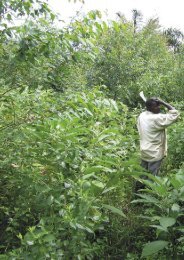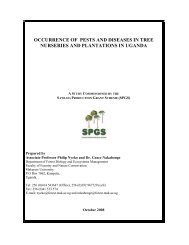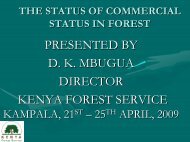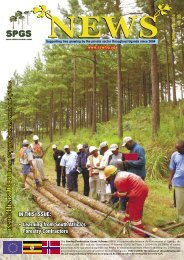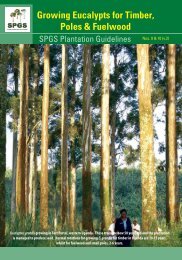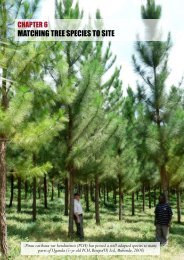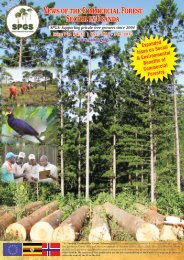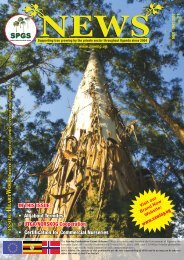You also want an ePaper? Increase the reach of your titles
YUMPU automatically turns print PDFs into web optimized ePapers that Google loves.
HeartWood No. 6 (2010)<br />
TRAINING, LABOUR PRODUCTIVITY AND<br />
SITE CLASSIFICATION<br />
Earlier in 2010, <strong>SPGS</strong> commissioned some<br />
important studies in areas identified as crucial<br />
to the long-term success of commercial tree<br />
growers. Draft reports have just (August,<br />
2010) been received from the first batch of<br />
these studies – namely:<br />
Training Needs Assessment by UNIQUE<br />
Forestry Consultants – Grit Techel, Kai<br />
Windhorst and Jochen Statz.<br />
Labour Productivity and Work Study by<br />
Rory McCaughan, an independent forestry<br />
consultant from Ireland.<br />
Developing a Site Classification System<br />
for Species Matching in Uganda by Dr.<br />
Colin Smith, a private forestry consultant<br />
from South Africa.<br />
NB. Once these reports have been finalized,<br />
they will be available to view/<strong>download</strong><br />
at www.sawlog.ug In the meantime we<br />
have summarized their key findings below<br />
to hopefully stimulate some thought and<br />
debate from readers. Please send feedback to<br />
info@sawlog.ug – put TA in subject box.<br />
TRAINING NEEDS<br />
UNIQUE were requested to assess the training<br />
needs of the sector and the institutional<br />
training capacities of the main players.<br />
Three main focus groups were identified<br />
– managers, supervisors and contractors.<br />
<strong>SPGS</strong>’s training programme and materials and<br />
other existing or potential training providers<br />
were also assessed.<br />
Many of the challenges named by the three<br />
focus groups tended to be very similar,<br />
being related to planning, plantation<br />
establishment, maintenance and protection<br />
and marketing of products or services. Other<br />
challenges are supervision and monitoring<br />
of work. Interestingly, here disagreements<br />
occur between the three groups, in particular<br />
between contractors and investors.<br />
Insufficient communication, communication<br />
structure and contract negotiation were cited<br />
as the main issues.<br />
Training needs expressed by the target groups<br />
were as follows:<br />
• Technical skills relating to plantation<br />
establishment and maintenance, fire<br />
protection, nursery operations, harvesting<br />
operations, plantation monitoring<br />
(inventory) and pests and diseases.<br />
• Planning on both the administrative and<br />
the operational level.<br />
• Business skills, referring to business<br />
management, contract management,<br />
labour management and computer skills.<br />
UNIQUE’s findings on the training providers<br />
were particularly interesting:<br />
<strong>SPGS</strong>: The training courses <strong>SPGS</strong> provides are<br />
highly valued by all participants. Additionally,<br />
exposure visits like the Clients’ meetings<br />
and direct feedback from inspection visits<br />
are also building capacity in the sector. The<br />
individual workload of each staff member<br />
is high, meaning that the organisation is<br />
currently stretched to its limits. There is<br />
demand for specialized courses and refresher<br />
courses as the structure is of the commercial<br />
plantation sector is maturing. Hence there is<br />
need to identify other institutions to include<br />
in longer term training plans.<br />
UTGA: at present UTGA does not have<br />
the organisational capacity or in-house<br />
experience to offer training. Nonetheless it<br />
can play an important part in facilitating<br />
efforts of clients to organize training courses<br />
themselves.<br />
Makerere University’s Faculty of<br />
Forestry: The Faculty is restricted by lack<br />
of infrastructure and also the lack of staff<br />
with appropriate experience, which hinders<br />
training of managers and supervisors. The<br />
more theoretical training courses, however,<br />
could be held within the Faculty’s premises<br />
e.g. plantation costing and planning.<br />
Nyabyeya Forestry College: NFC has<br />
extensive forest land - mostly planted with<br />
pines and eucalypts. However, the stands are<br />
of poor quality. Also the technology used<br />
and standards are not always up to date or<br />
in accordance with <strong>SPGS</strong>’s guidelines. Many<br />
staff have had very little experience with<br />
commercial plantations.<br />
Other recommendations:<br />
• Contractors are of increasing importance<br />
for the sector. Their skills in business and<br />
labour management need to be improved<br />
immediately.<br />
• <strong>SPGS</strong> staff need to specialize further,<br />
particularly with regard to the more<br />
sophisticated and increasing training<br />
needs of investors, plantation managers<br />
and contractors.<br />
• The potential of the private sector needs<br />
mobilizing by facilitating coordination of<br />
private sector training or helping to set up<br />
Public Private Partnerships.<br />
LABOUR PRODUCTIVITY<br />
<strong>SPGS</strong> staff identified problems with low labour<br />
productivity and also that there was little<br />
– if any - historical data upon which to base<br />
expected labour productivity or daily task<br />
rates for labourers. In order to rectify this,<br />
<strong>SPGS</strong> invited Mr Rory McCaughan to assist<br />
them and also to train <strong>SPGS</strong> staff in Work<br />
Study techniques. Rory is an experienced,<br />
practical forester who at one time was<br />
Mondi’s Work Study man in South Africa and<br />
Swaziland. After visiting a selection of <strong>SPGS</strong><br />
Clients, he was visibly shocked with what<br />
he found: these are his main findings and<br />
recommendations:<br />
The generally poor labour productivity<br />
cannot be blamed on one single factor but<br />
on a group of factors that have an influence<br />
on each other – in particular:<br />
Weed growth:<br />
Of the biological factors, the rate of weed<br />
growth was far and away the most detrimental<br />
to productivity both in terms of tree growth<br />
and man-days per hectare expended on<br />
weed control. Lack of pre-plant and postplant<br />
chemical weeding leads to very high<br />
labour requirements and subsequent slashing<br />
operations.<br />
Poor time-keeping:<br />
Of the other factors effecting productivity,<br />
poor time-keeping and supervision are<br />
the most influential. Poor time-keeping<br />
is ingrained in the rural workforce and it<br />
is anticipated that breaking this pattern<br />
of behaviour will present challenges to<br />
employers. Nevertheless, working a full day<br />
is a prerequisite for any successful business.<br />
Amongst the many recommendations were<br />
the following:<br />
• Contractors (and <strong>SPGS</strong> Clients) need to be<br />
made aware of the inefficiencies of poor<br />
time-keeping.<br />
• It is suggested that 8 hours be set as<br />
a standard working day (Nb. this is<br />
productive time, excluding meal breaks,<br />
transport etc).<br />
• Workers should be encouraged to take food<br />
to the workplace (or have food provided<br />
at the work-place) even if this flies in the<br />
face of tradition.<br />
• Employers should consider transporting<br />
labour to the workplace: this ensures all<br />
the labour arrives at the same time and<br />
also encourages teamwork.<br />
• Transport would also allow food and water<br />
to be brought to the site, which encourages<br />
good performance.<br />
7



